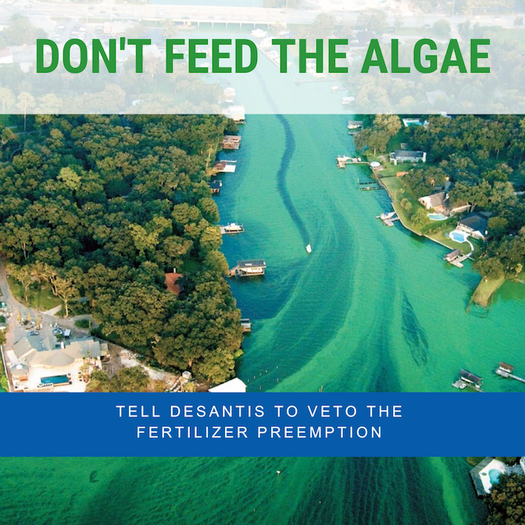
Excess nutrients are one of the leading pollution issues across the state - causing harmful algal blooms, fish kills, and dangerous conditions for both people and wildlife. Runoff from fertilizer is a common source of excess nutrient pollution. Because of this, many cities and towns across the state have adopted ordinances to regulate when and how fertilizer is applied in order to minimize runoff. Many localities have enacted a summer blackout period, during which time fertilizer application is not allowed. These key summer blackout periods are an easy, common-sense, and cost-effective tool to prevent fertilizer pollution during the rainy season when ...
Excess nutrients are one of the leading pollution issues across the state - causing harmful algal blooms, fish kills, and dangerous conditions for both people and wildlife. Runoff from fertilizer is a common source of excess nutrient pollution. Because of this, many cities and towns across the state have adopted ordinances to regulate when and how fertilizer is applied in order to minimize runoff. Many localities have enacted a summer blackout period, during which time fertilizer application is not allowed. These key summer blackout periods are an easy, common-sense, and cost-effective tool to prevent fertilizer pollution during the rainy season when stormwater can wash fertilizer off the land and into our waterways.
In the waning hours of the legislative session, lobbyists for the fertilizer industry snuck a provision into the budget proviso that would prohibit local governments from adopting or amending fertilizer ordinances that include a summer blackout period in the next year. This will hinder local governments from taking action to protect their local waterways from nutrient pollution, at a time when many of Florida’s waters are critically impaired. Since this language was inserted at the last minute, it was never discussed during any committee meetings, it was never available for public comment, and it was buried in hundreds of pages of budget documents.
The preemption language is tied to a $250,000 appropriation to the University of Florida's Institute of Food and Agricultural Sciences (IFAS) to study the impact of preempting local fertilizer regulations for the next year. We need DeSantis to veto the proviso language that allocates $250,000 to IFAS to study fertilizer preemption ordinances, so that local governments retain control to protect their waterways from nutrient pollution.
Bottom Line: Lawmakers are trying to take away one of the most effective tools local governments have to address Florida’s water crisis for the benefit of the fertilizer industry.
The legislature is trying to stop local governments from protecting their waterways from nutrient pollution by adding language to the budget at the last minute that would prohibit local governments from adopting or amending fertilizer application ordinances for the next year. We need your voice to ask Governor DeSantis to VETO the proviso following line item 146 in SB 2500 regarding the $250,000 for UF/IFAS to study seasonal fertilizer restrictions and the associated preemption.
Customized emails are more impactful. You can include things like: